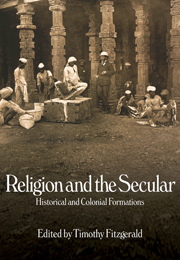Book contents
- Frontmatter
- Dedication
- Contents
- Acknowledgements
- Contributors
- Introduction
- 1 Dialectics of conversion: Las Casas and Maya colonial Congregación
- 2 A higher ground: the secular knowledge of objects of religious devotion
- 3 Secularizing the land: the impact of the Alaskan Native Claims Settlement Act on indigenous understandings of land
- 4 The formative process of State Shinto in relation to the Westernization of Japan: the concept of ‘religion’ and ‘Shinto’
- 5 Religious and secular in the Vietnam War: the emergence of highland ethno-nationalism
- 6 Colonialism all the way down? Religion and the secular in early modern writing on south India
- 7 Understanding politics through performance in colonial and postcolonial India
- 8 Real and imagined: imperial inventions of religion in colonial southern Africa
- 9 Religion in modern Islamic thought and practice
- 10 Rudolf Otto, cultural colonialism and the ‘discovery’ of the holy
- 11 Encompassing Religion, privatized religions and the invention of modern politics
- 12 Colonialism and the myth of religious violence
- Index
Introduction
- Frontmatter
- Dedication
- Contents
- Acknowledgements
- Contributors
- Introduction
- 1 Dialectics of conversion: Las Casas and Maya colonial Congregación
- 2 A higher ground: the secular knowledge of objects of religious devotion
- 3 Secularizing the land: the impact of the Alaskan Native Claims Settlement Act on indigenous understandings of land
- 4 The formative process of State Shinto in relation to the Westernization of Japan: the concept of ‘religion’ and ‘Shinto’
- 5 Religious and secular in the Vietnam War: the emergence of highland ethno-nationalism
- 6 Colonialism all the way down? Religion and the secular in early modern writing on south India
- 7 Understanding politics through performance in colonial and postcolonial India
- 8 Real and imagined: imperial inventions of religion in colonial southern Africa
- 9 Religion in modern Islamic thought and practice
- 10 Rudolf Otto, cultural colonialism and the ‘discovery’ of the holy
- 11 Encompassing Religion, privatized religions and the invention of modern politics
- 12 Colonialism and the myth of religious violence
- Index
Summary
It may be a happy accident that this effort of defining religion converges with the liberal demand in our time that it be kept quite separate from politics, law, and science – spaces in which varieties of power and reason articulate our distinctively modern life. The definition is at once part of a strategy (for secular liberals) of the confinement, and (for liberal Christians) of the defence of religion.
(Talal Asad 1993: 28)I would go even further than this: the very concept of religion as such – as an entity with any distinction whatever from other human phenomena – is a function of these same processes and historical moments that generate an individualistic concept of it (in fairness, Asad 1993: 29 hints at this).
(William Arnal 1999: 31)INTRODUCTION: THE PROBLEM SITUATION
“A Matter of Power, Not Religion” is the title of a two-page interview with Fred Halliday (2005). Halliday, who is Montague Burton Professor of International Relations at the London School of Economics (LSE) and a fellow of the British Academy, and author of books on Islam, was interviewed about the “war against terrorism” by Adam Holm of the Danish weekly political magazine Opinion. Halliday is an interesting writer, but here I draw attention to the implications of the title: that religion and power are distinct and separate alternatives – a matter of power, not religion.
- Type
- Chapter
- Information
- Religion and the SecularHistorical and Colonial Formations, pp. 1 - 24Publisher: Acumen PublishingPrint publication year: 2007



